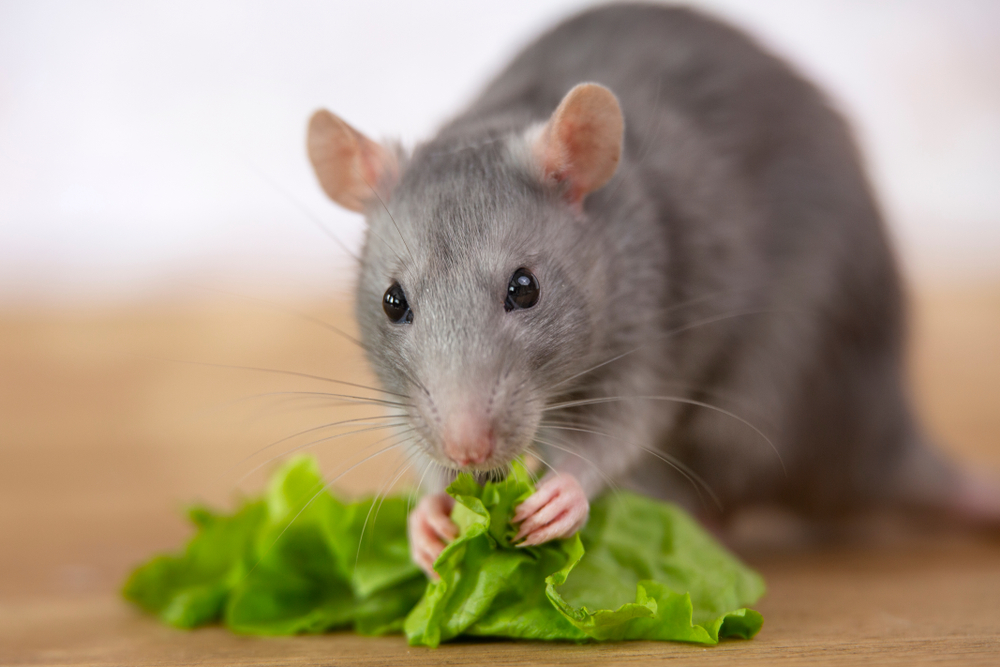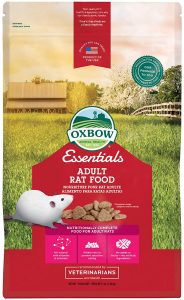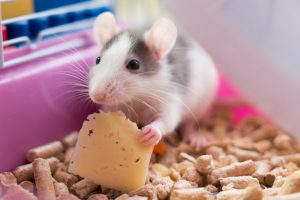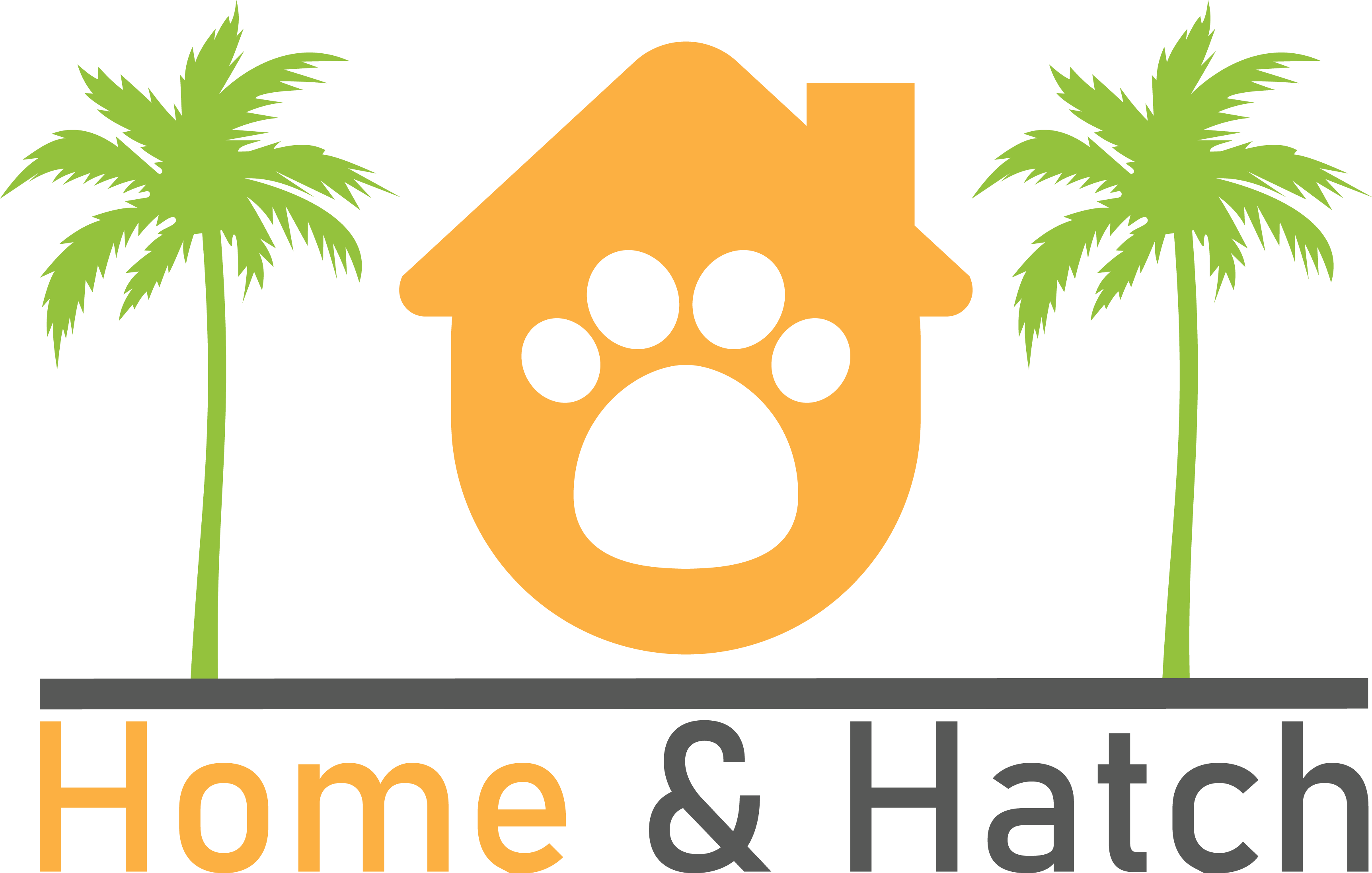
This post may contain affiliate links.As an Amazon Associate, we earn from qualifying purchases
A rat is a great animal to have as a pet. They require much less space than dogs or cats, and you don’t have to take them out on walks or worry about them ruining your curtains. But to make sure your pet rat stays healthy and strong, you should make sure it’s getting the perfect pet rat diet.
Rats living in the wild consume a huge variety of foods that make sure their nutritional needs are fully satisfied. Rats eat seeds, grains, insects, and practically anything they can get their tiny little paws on. Rats are omnivores, which means that they eat both plant stuff and animal proteins. So, if you want your rat to be healthy, you need to make sure it gets a similar omnivorous diet.
The biggest part of your pet rat’s diet should be a fortified, well-balanced rodent block or pellets. The block/pellets shouldn’t have any artificial colors, preservatives, or flavors. The pellets or block will serve as the backbone for your rat’s diet. If your pet rat gets the right diet and the proper exercise, it will ensure that they don’t get obese – rats are susceptible to obesity and the secondary health problems that it can cause.
The Cornerstone Of Your Rat’s Diet – Fortified Foods
When you buy fortified food for your rats, you should examine the nutrient value of the food, both for micronutrients and macronutrients. The macronutrients are the most important – carbohydrates, proteins, and fats – but you need to know all of the ingredients to get a complete picture of the fortified food.
Ingredients in food will be listed according to the percentage of the food that they represent. Read through at least the first 10 ingredients to get a rough idea of the major ingredients that make up the product. But you should read all of the ingredients if you want to be sure what you’re buying.

Fiber Is Just As Important As Proteins And Fats
Most people are aware that rats are omnivorous and require both protein and fats in their diet. But many people forget that fiber is an essential part of a pet rat diet. There are two types of fiber – insoluble fiber and soluble fiber. Soluble fiber is found in a variety of sources, including oats, flaxseeds, and barley.
When soluble fiber passes through the digestive tract, it forms a kind of gel that is good for the digestive system. It results in better stool quality, colon health and can even help lower cholesterol levels.
Insoluble fiber is found in several sources, including cereal hulls, wheat bran, and grass hays. Insoluble fiber doesn’t make a gel. Instead, it goes through the digestive tract unchanged. The function of insoluble fiber is to help bowel movement and promote a healthy digestive tract.
Insoluble fiber has been proven to control diabetes and reduce obesity.
Pet Rats require both types of fiber – soluble and insoluble – to remain healthy. Ideally, a combination of both types of fibers should be given to your pet rat. A good quality rodent block or pellet will contain both types of fiber, along with proteins, fats, carbohydrates, vitamins, and minerals.
You can give your rat supplemental foods along with the pellets or block to provide extra nutrition to your furry little friend.

Good Supplemental Rat Foods
Rats are opportunistic eaters, which means they’re not picky about what they eat. They’re willing to ingest a huge variety of foods, and they have the ability to digest almost anything. That’s one reason why rats manage to thrive almost anywhere on the globe.
Rats are a bit greedy when it comes to high-calorie foods, especially those with high sugar content. So, you need to limit these kinds of foods if you want your rat to stay healthy. The supplemental foods should be vegetables and greens. Try to mix in some fruits and grains, too, to keep your cute little friend strong and fit.

If you want to give your pet rat some extra fat nutrition, then you can feed them sunflower seeds, pistachio nuts, pumpkin seeds, pecans, avocado without the skin, and brazil nuts. Make sure that none of the nuts are salted, and the hard shells have all been removed beforehand,
Rats are neophobic eaters, which means that they are hesitant about eating foods they haven’t seen before. So, when you give your pet rat something new to eat, make sure that the quantity is very small, like the size of a pea, so your pet won’t be overwhelmed. Or you can mix in the new food with your pet’s usual diet.
You can have some fun with your pet rat once it’s gotten used to the new supplemental foods. You can hide the food all over its home and let it find the food itself. Rats have an incredibly strong sense of smell, plus they love playing games, so this will be great fun for both of you.
Mental And Physical Enrichment
Apart from food, rats need to have a mentally stimulating environment to stay healthy. Rats are social animals, and experts recommend that you keep at least 2 rats together. Having a friend means your pet rat gets mentally stimulated through social interaction, and he also has someone to play with, which means that it gets some fun exercise.
You can also add some toys for your pet rat to play with or maybe some loose hay. The hay can give your rat some nutrition while also providing some material to nest in. You can make simple toys at home for your pet to play with using newspaper or toilet rolls.
Frequently Asked Questions
Q: How can I keep my pet rat happy?
A: A happy and healthy rat will be active and curious. If there’s too much noise to hear things, or if your pet is caged all day, then it’s not getting the stimulation it needs to stay healthy. So, you need to give your pet a well-adjusted rat home. This means providing enough space for your pet, with lots of things to play with and hide in.
Q: What’s the best thing I can feed my rat?
A: Rats are omnivores, which means that they eat both plant-based foods and meat-based food. But their main diet should still be vegetables and greens. Some supplemental foods that are suitable for your pet rat include boiled eggs, cottage cheese, boiled chicken, and boiled beans.
Q: How much water do I need to keep my rat hydrated?
A: You can leave a small bottle of water in the cage at all times, but you also want to make sure that your rat always has access to freshwater. You don’t want your pet to dehydrate, which can cause sickness and even death. Also, remember that rats are small animals, so they need very little water.






